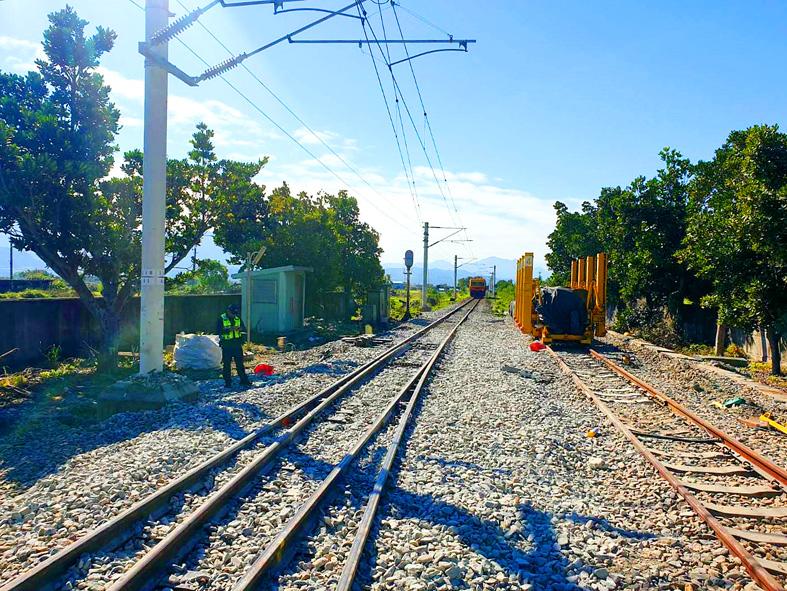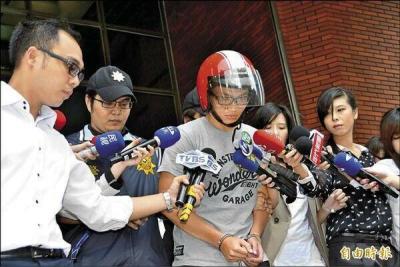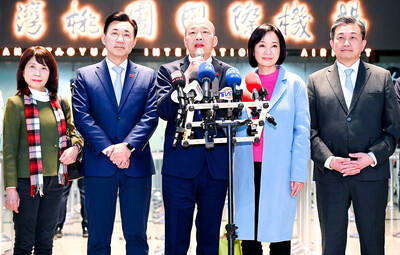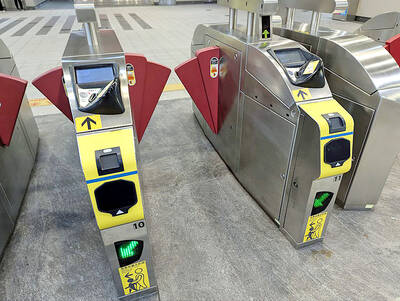By 2027, a second track is to be installed on the railway line connecting Hualien and Taitung counties, the Railway Bureau said yesterday.
Hualien Station is 162km from Taitung County’s Chiben Station, but 112.65km of the distance consists of sections of single track, Eastern Engineering Office deputy director Hsia Heng-ren (夏恒仁) said.
Thirteen curved sections of track with a radius of less than 800m would also be improved, while electric cables, signals and facilities along the route would be upgraded, Hsia said.

Photo courtesy of the TRA
With a single track, trains need to wait at a loop if other trains need to go first, he said, adding that the dual-track system would fix that.
The Taiwan Railways Administration can maintain two-way operations on one of the tracks if there is an incident on the other, he added.
A dual-track system would increase the capacity of the Hualien-Taitung railway line from two to three trains per hour to seven to eight trains per hour, Railway Bureau chief engineer Lu Hsin-hsi (呂新喜) said.
Commuter trains would cut their travel time between Hualien and Taitung by 45 minutes, while Tzuchiang-class express trains would reduce their time by 12 minutes, Lu said.
The Hualien-Taitung railway line was fully electrified by June 2014.
The Executive Yuan approved the dual-track project in April, after it passed an environmental impact assessment in August last year.
Construction on the project, which would cost NT$45.62 billion (US$1.64 billion), is to begin by the end of next year, the bureau said, adding that the second track is expected to become operational by October 2027.

Death row inmate Huang Lin-kai (黃麟凱), who was convicted for the double murder of his former girlfriend and her mother, is to be executed at the Taipei Detention Center tonight, the Ministry of Justice announced. Huang, who was a military conscript at the time, was convicted for the rape and murder of his ex-girlfriend, surnamed Wang (王), and the murder of her mother, after breaking into their home on Oct. 1, 2013. Prosecutors cited anger over the breakup and a dispute about money as the motives behind the double homicide. This is the first time that Minister of Justice Cheng Ming-chien (鄭銘謙) has

BITTERLY COLD: The inauguration ceremony for US president-elect Donald Trump has been moved indoors due to cold weather, with the new venue lacking capacity A delegation of cross-party lawmakers from Taiwan, led by Legislative Speaker Han Kuo-yu (韓國瑜), for the inauguration of US president-elect Donald Trump, would not be able to attend the ceremony, as it is being moved indoors due to forecasts of intense cold weather in Washington tomorrow. The inauguration ceremony for Trump and US vice president-elect JD Vance is to be held inside the Capitol Rotunda, which has a capacity of about 2,000 people. A person familiar with the issue yesterday said although the outdoor inauguration ceremony has been relocated, Taiwan’s legislative delegation has decided to head off to Washington as scheduled. The delegation

TRANSPORT CONVENIENCE: The new ticket gates would accept a variety of mobile payment methods, and buses would be installed with QR code readers for ease of use New ticketing gates for the Taipei metro system are expected to begin service in October, allowing users to swipe with cellphones and select credit cards partnered with Taipei Rapid Transit Corp (TRTC), the company said on Tuesday. TRTC said its gates in use are experiencing difficulty due to their age, as they were first installed in 2007. Maintenance is increasingly expensive and challenging as the manufacturing of components is halted or becoming harder to find, the company said. Currently, the gates only accept EasyCard, iPass and electronic icash tickets, or one-time-use tickets purchased at kiosks, the company said. Since 2023, the company said it

A tourist who was struck and injured by a train in a scenic area of New Taipei City’s Pingsi District (平溪) on Monday might be fined for trespassing on the tracks, the Railway Police Bureau said yesterday. The New Taipei City Fire Department said it received a call at 4:37pm on Monday about an incident in Shifen (十分), a tourist destination on the Pingsi Railway Line. After arriving on the scene, paramedics treated a woman in her 30s for a 3cm to 5cm laceration on her head, the department said. She was taken to a hospital in Keelung, it said. Surveillance footage from a